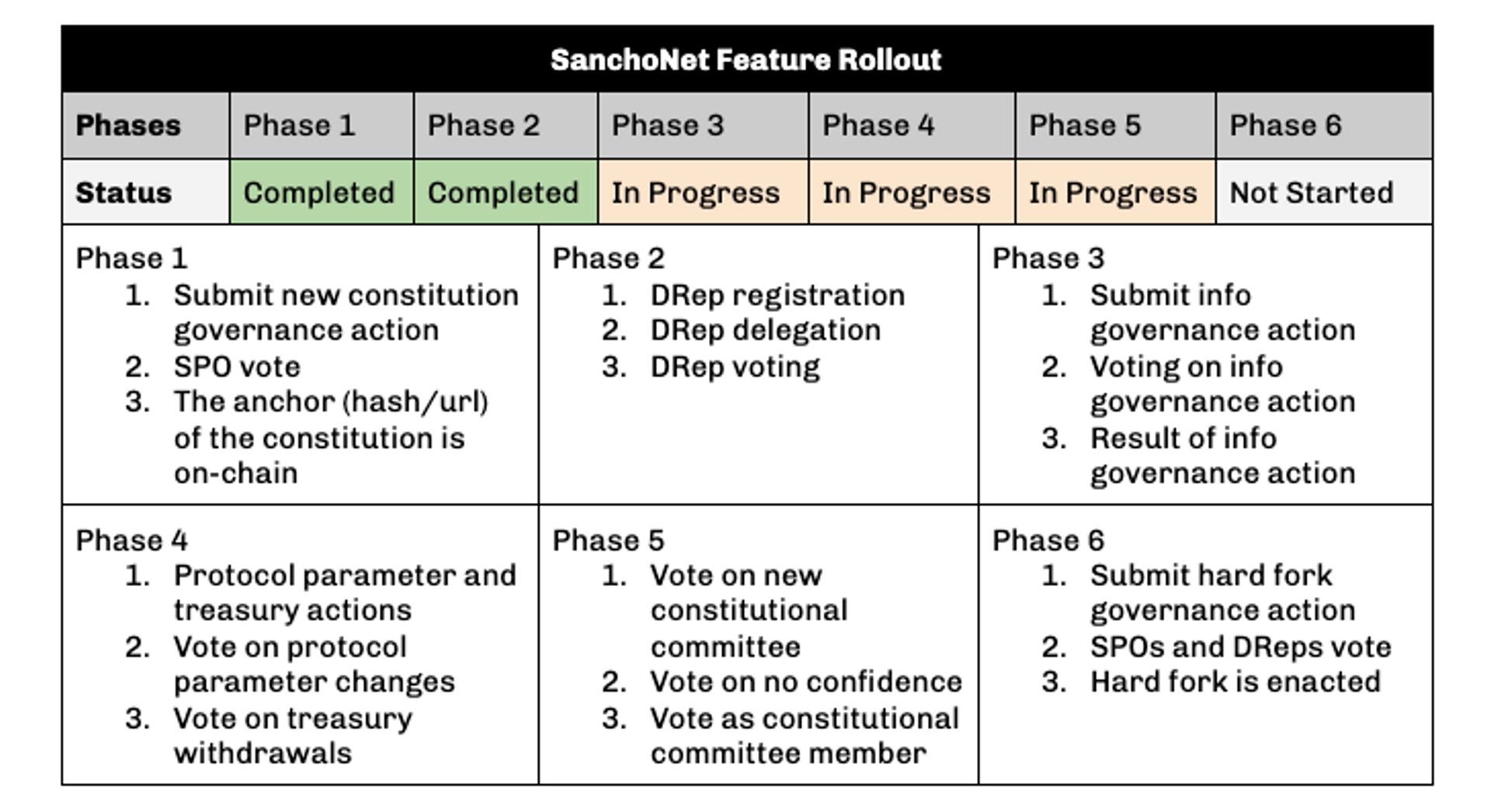CIP-1694 Progress Update: unveiling the latest developments in governance

SanchoNet: A Who’s Who
Big names contributing to SanchoNet
Designed as a collaborative environment for the Cardano community, learnings and developments from SanchoNet will be key to advancing governance for Cardano. SanchoNet welcomes some big names this month including Adam Dean as a maintainer to the testnet. Additionally, Blockfrost now provides access to SanchoNet through its API. Thank you to Marek and team for your contributions. This is an exciting update for the Cardano community, as it eases building for the developers in the ecosystem.
Over 32 SPOs have joined so far and more are joining every day. Continue reading for more technical updates and ways to get involved on SanchoNet.
Technical updates
Currently Implementing Phases 3-4-5 concurrently
SanchoNet is about developing and testing the technical components and processes required to fully implement on-chain governance for Cardano within CIP-1694. In the months ahead, SanchoNet will follow an independent development roadmap scoped from a technical governance perspective, which will allow for full experimental and iterative progress.

DB-Sync
Fundamental tooling.
Please see latest DB-Sync Tag sancho-1-1-0, this is compatible with the new Cardano node-8.3-pre, so it is able to connect to the latest SanchoNet iteration - which contains the new DRep Certificates.
The DB schema is unchanged from the first DB-Sync Sancho build (1-0-0), see more info on how the DB-Sync naming works here.
CIP-95:
A proposal designed to empower ada holders with liquid democracy capabilities.
As Cardano moves towards the next stages of participatory governance in CIP-1694, wallet providers become integral infrastructure providers for individuals to take part in governance – right from their personal wallet. Stay connected with the latest developments and contribute on Github.
On Tuesday, September 19th Ryan Williams hosted the second Sancho-wallets open hour on Discord. The open hours, taking place biweekly, are the space where the latest technical SanchoNet news will be discussed alongside the final adjustments to CIP-95 (check the server events to see the next). The call is open to all attendees, with special relevance for all wallet providers interested in Voltaire. We are looking forward to seeing you next time.
First Alpha build of the Serialization Library for Conway ledger era
Serialization Library:
A library for serialization & deserialization of data structures.
EMURGO released the first few Alpha builds of their Serialization Library for the Conway ledger era. This build now supports:
- All new certificates - DRep Reg/Retire/Update, Vote Delegation, etc.
- Voting
- All types of Governance Action
The library can be used to generate new certificates and transactions that can be submitted to SanchoNet.
See Github for more details and join the discussion. The team at EMURGO welcomes all feedback, but also stresses once again that this is an Alpha build.
Get Involved in SanchoNet
A vibrant, inclusive, and community-driven testing ground for inventive governance features, SanchoNet provides unique opportunities for the Cardano community to get involved in shaping Cardano’s future. As SanchoNet advances in its journey of implementation and feature rollout, the community is strongly encouraged to embrace specific roles crucial for testing and refining the governance mechanisms.
This week’s digest is dedicated to give a deeper introduction and updates on the role of Delegated Representatives (DReps). DReps are registered members of the Cardano community who have received the delegation of voting power either from themselves or others in the community. In the same way, ADA delegated to a pool is not transferred, ADA delegated to a DRep does not change its ownership. ADA holders can migrate their ADA from DRep to DRep at any point, or break down their ADA into portions delegated to different DReps (if your wallet provides multi-stake key capabilities.)
There are two types of voting actions under CIP-1694. Ada holders may either delegate their votes to DReps as described below or elect one of two predefined voting options. Staking rewards continue to accrue to the ADA holder who delegates to one of the options above. Participation in governance is enabled by delegation to one or more DReps. Any ADA holder can choose to become a registered DRep or delegate their ADA stake to one or more registered DReps.
There are two predefined voting options: “abstain” and “no confidence.” The predefined options have a few unique attributes to consider. Both options, once selected will remain the selected response until the ADA holder selects otherwise. “Abstain” means that the votes will not be counted as a part of any ongoing governance actions. However, such ADA holder’s stake will be considered to be registered for the purpose of staking rewards. The “no confidence” option is equivalent to a “no” vote on every governance action apart from a "Motion of no confidence" vote with respect to the Constitutional Committee (where it means “yes”) and is considered a part of the active voting stake. Delegating to “no confidence” also gives the option to signal dissatisfaction with the governance system overall.
As Cardano enters the age of Voltaire, participatory governance advances for the whole ecosystem. With SanchoNet as a playground for testing on-chain governance actions, the importance of delegation comes into clear view. As ADA holders are able to delegate, every voice can be counted and every voice considered.
Learn more about getting involved at http://sancho.network.
*If your ADA is held on a third-party platform, please check with that platform to assess their delegation practices.